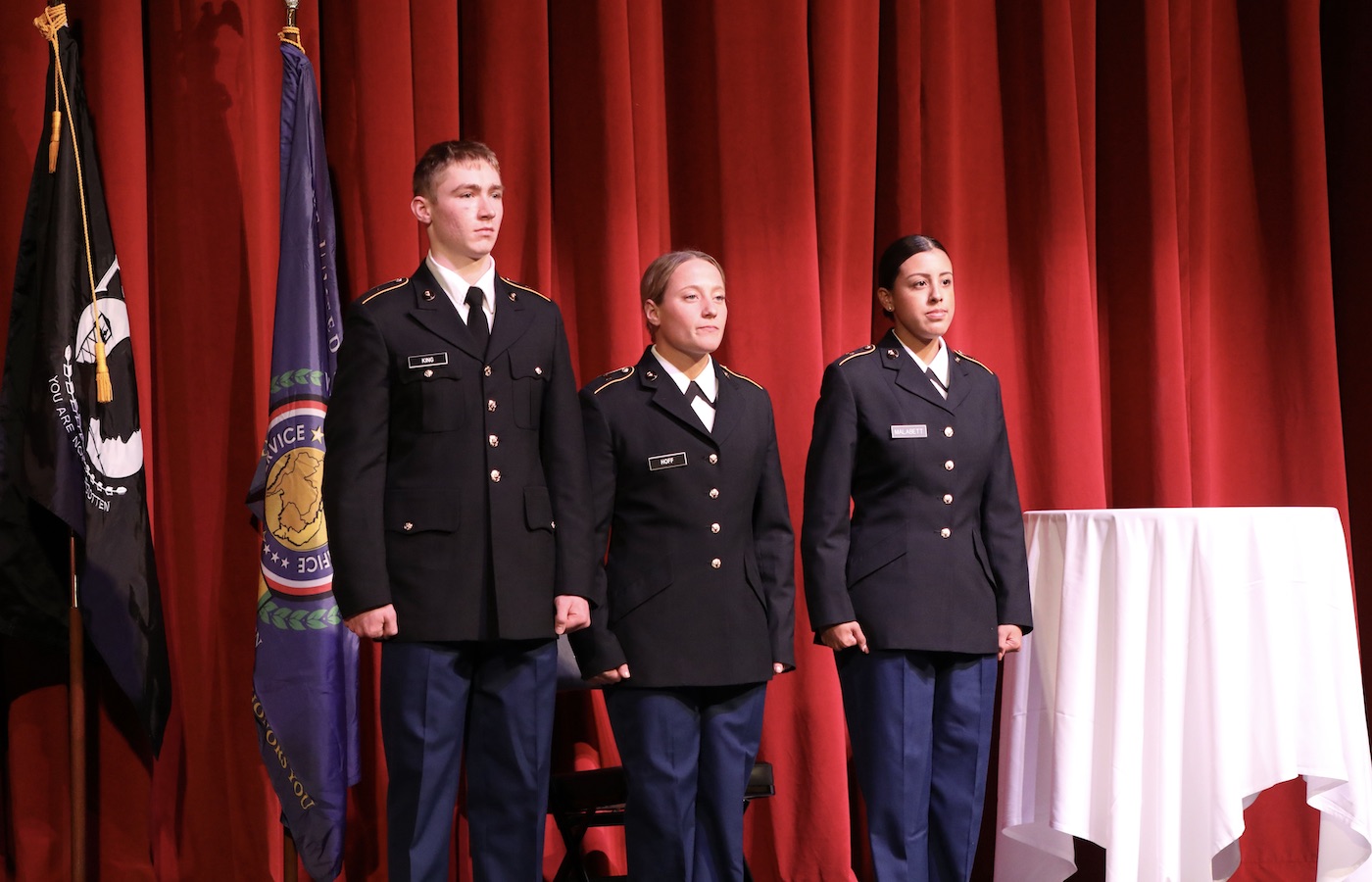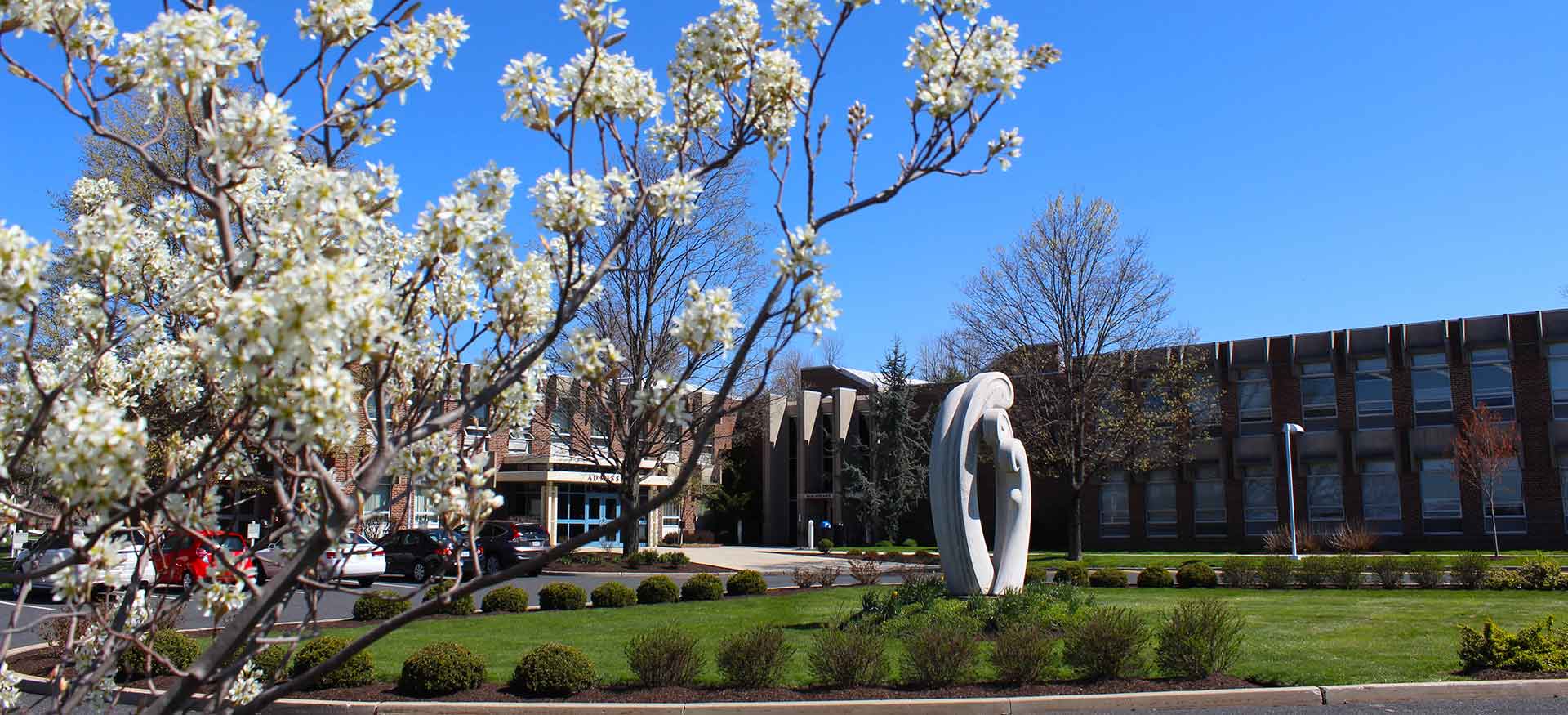A Conversation with Allison Hoff ’23, M’25, Cadet

Allison Hoff ’23, M’25, center, with Nathan Hugaboom ’27 and Valery Malabett ’25 at DeSales University’s Veterans Day ceremony.
Major: Master of Arts in criminal justice, investigative forensics
Current title: ROTC, cadet
What inspired you to become a cadet?
In 10th grade, I spent a week at West Point for a soccer camp and came away from the experience completely enamored. I applied for a four-year National ROTC scholarship before the start of my first year at DeSales University and was declined. I was discouraged but kept moving forward and figured it just wasn’t meant for me. Fast forward to April of 2023, when I attended the military funeral of my great-grandfather at Arlington National Cemetery. I cannot fully express how humbling and beautiful it was. It sounds odd to say I felt called to take my place in the military while standing in a cemetery. On the way home, I started talking with my parents about the possibility of pursuing enlistment and Officer Candidate School.
You spent six weeks at Fort Knox, Kentucky, for an intensive boot camp to get ready to enter the ROTC. What was that like?
I’m now a graduate student at DeSales, so I thought the opportunity to participate in ROTC had long passed. When I found out it was still possible, I was thrilled and willing to do whatever I could to join the program, and completing basic camp was a prerequisite to help catch me up to speed. Basic Boot Camp is designed specifically for cadets like me to introduce basic military skills, etiquette, equipment, and jargon—all things I would need to succeed as a junior-level cadet. Land navigation, rucking, weapons use and maintenance, and tactics in the field are just part of the skills introduced.
Describe a typical day in the life of an ROTC cadet.
It can look slightly different for each cadet depending on how involved they are in the program. Typically, all cadets wake up early during the week for morning PT. First formation is usually 0500. PT usually lasts 90 minutes before cadets travel to their respective campuses for classes. Cadets also partake in a military science course during the week, and on lab days we execute what we have learned. The labs are hands-on and tactical training opportunities. All cadets participate in a battalion run or ruck each week and have additional opportunities to get involved or volunteer.
I am also on the Ranger Challenge team, so practice is from 1620-1830 Monday-Friday. This is the varsity sport of ROTC where we compete against other schools in military tests. I enjoy the physical and mental challenges, and our team is extremely motivated with great morale. We recently came in first place for the whole northeast.
What are some of the benefits and challenges of being in the program?
Being a student and cadet is as much a privilege as it is demanding. I think it is important to be as involved in the ROTC program as possible to get the most out of it. However, school is an equal priority and coincides with my performance as a cadet. Time management is critical for success. It’s also an exciting time; the possibilities and opportunities ahead feel tangible.
I’ve honestly met the best people throughout this experience. I’m thankful to be surrounded by individuals who have clear goals, direction, positivity, and experiences. When you surround yourself with those who are willing to invest, teach, learn from you, and cheer you on at the same time—that is something special. Being an ROTC cadet has inspired me to always strive to do more and be more. One of our mottos is “Better people make better cadets” and it inspires me to volunteer, try new things, and take on more opportunities. I identify with the DeSales motto “Be who you are and be that well” just as much. I aim to embody these thoughts throughout my life.
What do you hope to accomplish post-graduation?
I have always had an interest in criminal justice. When I was younger, I would binge-watch “Forensic Files” and cold case documentaries. After earning my master’s degree, my goal is to be commissioned as an active-duty Army officer in the branch of either military police, intelligence, or aviation. I want to serve my country proudly and learn everything I can while doing that. After service, I am most interested in working for the state police or a federal agency.
This November, DeSales is highlighting members of our campus community who have served or are currently serving in the armed forces. We appreciate all that you do.




